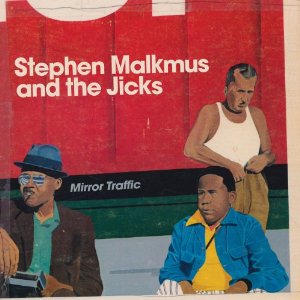"There’s no alacrity," the singer-songwriter avers, and, boy, he means it. Buried at the end of Mirror Traffic, his fifth album since Pavement dissolved in the late nineties, ‘Fall Away’ does all Stephen Malkmus can do in 2011: marry an aphorism—preferably one with a polysyllabic—to a melody shaped like an isosceles triangle, attach a serpentine guitar lick, and avoid tripping over the loping rhythm. Aging rockers revert to conversational cadences as unavoidably as they keep to one glass of wine before dinner; the trouble with Malkmus is how quickly he lost interest in the breathless tunelets with which Pavement carved its initial reputation. His solo years document a lapse into the binaries his Pavement music avoided: "song" albums (the eponymous debut, Face the Truth) preceded "jam" ones ( Pig Lib and Real Emotional Trash), with the first group representing the folly of singer-songwriter "craftsmanship" and the second how craftsmanshp can curdle spontanenity, like lemon juice in milk.
But Malkmus has studied the Aging Rocker textbook: he’s hired an outside producer to "shake things up" or something, this one infamous for affecting spontaneity at will. However, Paul McCartney working with Nigel Goodrich still sounds like McCartney, so other than the rolling piano arpeggios, harmonica, and quiet horn arrangement over the last minute of ‘No One Is (As I Are Be)’ it’s just as hard to catch Beck’s aural signposts on Mirror Traffic. If anything, Malkmus, allowing the album’s rote tunefulness to dissipate over the course of sixteen songs, is as uninhibited as ever; the Jicks, allowed a performing credit, are as wan as 10,000 Maniacs covering 10,000 Maniacs. There’s just too much Malkmus, too much failed quirk; he’s like a Little League coach ordering kids to follow strategies that are beyond their comprehension. And that ol’ devil craftsmanship ensures that the lyrics find musical correlatives, as on ‘Senator’, one of his usual crypto-narratives and dependent on stop-start dynamics that place the emphasis on the line "All the senator wants is a blowjob." Of course disgraced former congressman and airport bathroom connoisseur Larry Craig can handle the opprobrium and then some, but Malkmus sounds as convincing as Tom Cruise shouting "penis" in Born on the Fourth of July.
Mirror Traffic is the kind of album that makes you loathe college education, if only because of the contortions to which zealous smart alecks Malkmus subjects the language. The soft-focus, pearly Wowee Zowee, which augured Malkmus’ quiet phase, boasted things like ‘Motion Suggests’ where the opacity was itself the point but his guitar and lovebuzzed whine intertwined like Mick ‘n’ Keef’s harmonies; he was drowning for your thirst, and you wanted to take him home to iron his long-sleeved shirt. On Mirror Traffic he still takes small risks like the martial drum-anchored freakout in ‘Forever 28′ that is Janet Weiss’ finest moment here or the giant distorto-riff coursing through the excellently titled ‘Stick Figures in Love’, but as a singer and controlling force he’s lost interest in inhabiting these scenarios. For every no-nonsense moment like the electric piano accompanying the buoyant couplet "There’s been some soft grass grown between us / When they talk about bad blood they don’t mean us" in ‘All Over Gently’, there’s the one about chasing a girl in Birkenstocks—an embarrassment for everyone involved. He’s got archness, miles and miles of archness, and it’s wasted.
It’s possible that my brain already holds as many Malkmus aphorisms as it can handle: "The language of influence is cluttered with hard, hard Cs" (1997’s ‘Starlings in the Slipstream’) and "I had a crap gin and tonic / It wounded me" (2001’s "Pink India") happen to be both absurd and true (ask my favorite bartender about the latter). It’s possible that listening to those songs for the first time now would nauseate me. Dense, professional, and thoroughly realized, Mirror Traffic will become a lot of people’s favorite Malkmus album. He sounds more like Malkmus than ever, and it makes me shiver. But consider: he’s, thankfully, doomed never to woo the unconverted again. Carrion is what we all become, brother.


